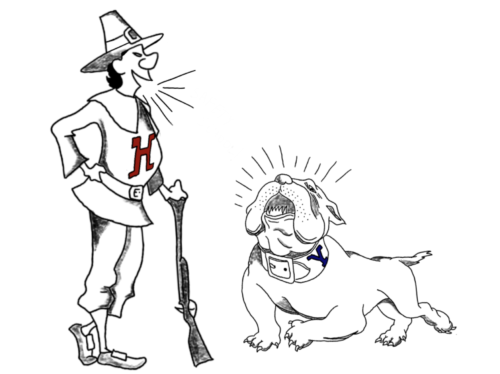The Harvard-Yale rivalry is entrenched in everything, not just football. Yale merch is informally forbidden on Harvard’s campus and jokes disparaging bulldogs and New Haven are abundant in Cambridge. There are significant differences between Harvard and Yale that are unrelated to football that fuel the rivalry between the schools. Harvard and Yale’s differences expand to the popular, school-specific terms used on campus. At the surface level, the differences in slang further the rivalry between Harvard and Yale. But when one looks a bit closer, the linguistic overlap establishes a sense of mutuality, bringing the two schools together.
Yale has quite a few terms to describe places to eat. “GHeav is what we call the grocery store everyone goes to,” mentioned Class of 2025 Yale student Diego Aspinwall. According to a list of “Yale Lingo” on Yale’s website, GHeav is “‘Good Nature Market’ (formerly named Gourmet Heaven), a 24-hour specialty grocery store.” Aspinwall explained, “Many students eat at ‘the Commons.’”
With non-equivalent, comparable terms at Harvard being CVS and DHalls, these are clearly notable differences in language and life between the two schools. When asked if Yale referred to their dining services as “YUDS”, Aspinwall said, “We don’t really have a term like that.” Perhaps it is a commentary on the quality of their food that Yale does not need a single-syllable acronym for their dining services like HUDS (Harvard University Dining Services) to blame for all their dining woes.
A rather silly set of terms Yale students use are “FroCo” (first-year counselor), and “CoCo” (two co-coordinators of a student organization.) While it’s certainly easy to make fun of these silly abbreviations, Harvard’s adjacent terms aren’t nearly as fun. With PAF (peer advising fellow) and co-presidents(?), our attempt to make mentors and leaders seem like more friendly resources pale in comparison to Yale’s.
Yale’s Residential College System has both similarities and differences to Harvard’s. At Yale, a student is randomly assigned to their residential college before matriculating, whereas at Harvard a student is placed in one at the end of their first year for their remaining three years. According to Aspinwall, Yale students abbreviate the names of most residential colleges. For example, Timothy Dwight residential college is often shortened to “TD.” Aspinwall noted that Timothy Dwight in particular is often ridiculed, as students think it’s a cult. At Harvard, we’re no better in this area (Kirkland House). We’re also not completely innocent when it comes to shortening house names, particularly in the case of our abbreviating Pforzheimer House to “PfoHo.”
Harvard’s Quad, known for its farther proximity to Harvard Yard over River Houses, has an equivalent at Yale. Yale’s new residential colleges, Murray and Franklin, are often simply referred to as “the far colleges,” as explained by Aspinwall. While Harvard tends to use consistent terms across the student body, Aspinwall mentioned there is a bit of a generational war going on with a slang term for the Yale residential colleges. “Younger students call residential colleges ‘ResCos’ but upperclassmen don’t do that, they think it’s kind of stupid. It’s a newer term,” Aspinwall stated.
Aspinwall noted that many of the differences in slang lend themselves to and are offshoots of cultural differences between the schools. People whisper about Yale’s secret societies, which hold a similar reputation on campus to Harvard’s final clubs. He mentioned that students call some of the oldest and top societies “landed societies.” Like at Harvard, these terms are completely inconsequential to some, and the pinnacle of social success to others.
Despite having similar exclusive spheres of social life (albeit different names for them), Yale’s social scene differs from Harvard significantly. This is apparent in the terms used at Yale relating to social life. The Yale social scene revolves significantly more around Greek life and sports. Aspinwall, a member of the Alpine Ski Team, implied that sports at Yale are also a popular way to carve out a social sphere. At Yale, athletic teams often have houses where they can host parties. The term “crew house” is a phrase that would never be used at Harvard in reference to the location of a party. Harvard sports teams certainly have a social aspect, but they are never considered as an alternative or replacement to a social club.
While there are both similarities and differences between Harvard and Yale lingo and in turn, social practices, the similarities are more numerous than one would expect. We both agonize over “p-sets” and we both have a “reading period” before finals. Many of our traditions are the exact same with different names. We might pride ourselves on the tradition of primal scream, but one Yale secret society, “The Pundits,” is also notorious for its naked parties and runs. Additionally, Aspinwall’s residential college has the “Saybrook Strip,” so keep an eye out for a horde of people suddenly getting naked at the Harvard-Yale Game.
We have one final slang term in common: The Game. While Harvard and Yale may have their linguistic and communal differences, they also have their similarities, and we can certainly find common ground in our annual tradition of going head-to-head on the football field.
Kayla Reifel ’26 (kaylareifel@college.harvard.edu) has been trying and failing to think of a way to abbreviate Adams House.

